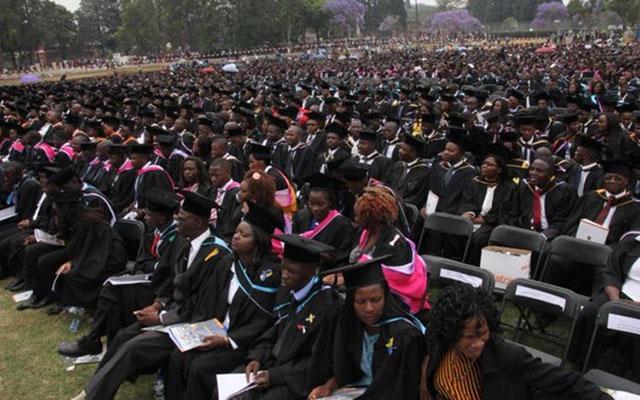Masters degree: New status symbol

Leroy Dzenga Features Writer
In Zimbabwe obtaining a masters degree seems to have become an esteem issue more than it is academic, with people flocking to institutions of higher learning in their pursuit.
Undergraduate students yet to complete their first degrees are already mulling what masters degree they could pursue before they go through their first academic hurdle.
Is it future planning on the students` part or they are following the new normal which has seen masters degree among other postgraduate qualifications becoming a staple among Zimbabweans who have walked the corridors of academia?
The surge, according to experts, is related to the ambition harboured by Zimbabweans in their quest for growth in their personal capacities. Great Zimbabwe University’s director of Postgraduate Studies Professor Pesanayi Gwirayi believes the hunger for growth is a huge factor.
“I agree that there is a surge in the number of people pursuing masters degrees in Zimbabwe. Instead of staying at home, the graduates end up pursuing masters degrees, with the hope of making themselves more qualified to compete for the few job opportunities. So the surge is by and large induced by economic ambition,” Prof Gwirayi said.
Using this yardstick, Zimbabwe may be home to some of the most ambitious people in the region. In countries like South Africa, few of their graduates are interested in pursuing masters degrees although the trend seems to be picking up now.
However, not every masters degree is a good investment. “Whether a person should enrol for a masters degree straight after completing an undergraduate degree or wait depends on their career trajectory.
In professions such as accounting, law, engineering, media, among others, it is advisable for the new graduates to have some kind of incubation period, during which they gain experience through practice,” said Prof Gwirayi.
Unless a person intends to end up in academia, it is not a straight-jacket case that they should head back to the lecture room immediately after acquiring their first degree.
“Those who would want to remain in academia, the earlier they do their masters and doctoral degrees, the better. This option appears to be more preferable to those pursuing careers in the arts and humanities than the commercials,” Prof Gwirayi said.
General sentiment is that a balance between academic qualifications and work experience produce a sharper expert under normal circumstances. “A holder of a masters degree in accounting, law or engineering who has practised through working in the relevant industry is likely to be a better academic than one who never practised,” said Prof Gwirayi.
He added; “There are also cases, even in developed countries, where people in their thirties or even younger, graduate with doctoral degrees.”
There have been concerns that Zimbabweans are now more interested in titles attached to academic qualifications, more than they are interested in using their postgraduate degrees to contribute to national development.
“The Zimbabwean society is gripped with the doctoral disease and has surpassed what Dore referred to as the diploma disease in the 1970s. “A postgraduate degree is the golden academic qualification. One has to go through the trenches of academia, fire shots, get fired at, and get killed, only to resurrect during graduation. It can be acquired only for show but it must have positive impact to the society,” Prof Gwirayi said.
Academic impostors are risking the otherwise well maintained credibility of the Zimbabwean education system. Basic concepts of demand and supply still apply to this dynamic; masters degrees may not have as much weight as they had two decades ago.
“The increase in the number of people acquiring masters degrees has several implications. First, it is further evidence that we are now living in a credential society, where higher qualifications may be required for a job that did not require as much in the past,” said Prof Gwirayi.
Just like in currency, academic qualifications are prone to inflation if they become too abundant for the holding market.
“We are seized with a situation one can describe as ‘qualification inflation’, which negatively affects the weight of the degree. The increase in the number of people acquiring masters degrees may also fuel corruption in the job market,” said Prof Gwirayi.
Another educationist, a senior lecturer at the University of Zimbabwe’s Department of Technical Education, Dr Peter Kwaira, believes there is a risk of people obtaining “useless” masters degrees just to fit the trend.
“There should be skills continuity when one decides to study for a postgraduate degree, especially masters. I have seen people even at doctoral level failing to get a job because there is no relationship between their first degree, masters degree and PhD. People should be careful in selecting their programmes,” Dr Kwaira said.
There is a benefit in becoming an expert in one field compared to oscillating over the broad academic space. “It helps to become a voice of authority in a particular field than to become a holder of credentials no one respects. People should carefully map their study choices before they run,” said Dr Kwaira.
However, there are fields that do not allow people to sit on their laurels, underpinning benefits that come embedded with the proliferating Masters degrees.
“We have fields that require people to continue upgrading themselves academically. In disciplines such as accounting, law and medicine one cannot afford to become rusty, there is a need for constant study,” Dr Kwaira said. Government has already put measures in place to ensure that the quality of the masters degrees is at an acceptable level.
The Zimbabwe Council for Higher Education (ZIMCHE) requires those who teach masters programmes to be holders of doctoral degrees. There have been conversations on legislature that will cement respect in the academic field.
Professor Jonathan Moyo, the Minister of Higher and Tertiary Education, Science and Technology Development, expressed his displeasure following a surge in the conferment of honorary doctoral degrees by bogus philanthropic organisations. The minister was officiating at a graduation ceremony at Mutare Polytechnic College on September 11, 2016.
He indicated that Government was working on legislation against this practice. It remains to be seen whether the country benefits from all the experts being produced by various universities or whether they will become a liability.
While personal growth, especially through school, is encouraged, the decision making has to be thought out because a masters degree disconnected from the first qualification may prove tricky.
There have also been suggestions that people are trying to make themselves more attractive for the relatively few available jobs, a trend that is worrying when the country is trying to promote entrepreneurship and employment creation by focusing on STEM subjects.
The reasons behind the surge vary but obtaining a masters degree is the in thing among Zimbabweans at the moment.
- Feedback: [email protected]









Comments